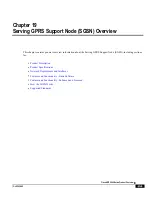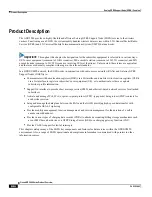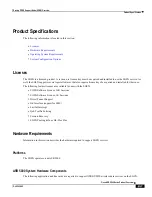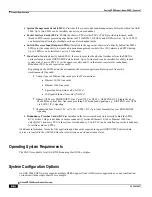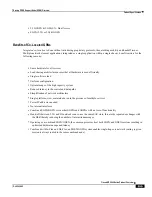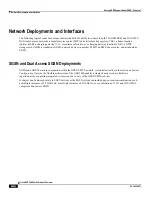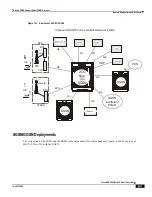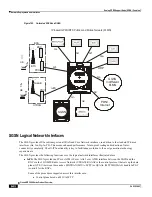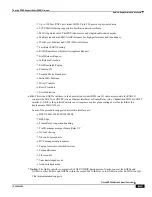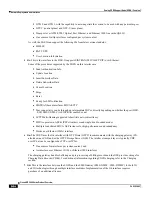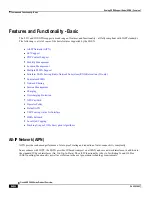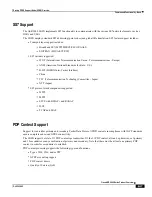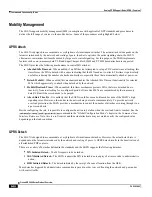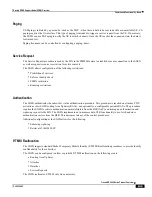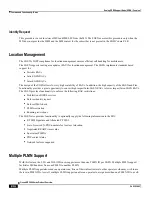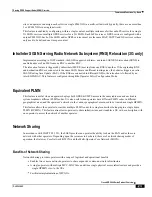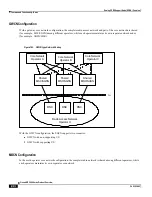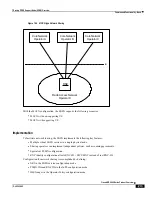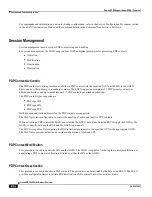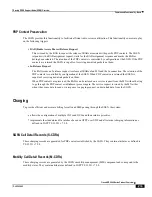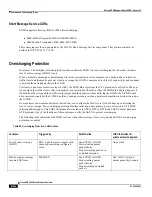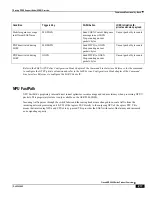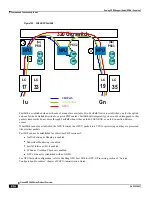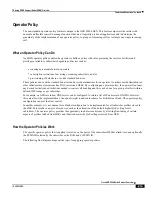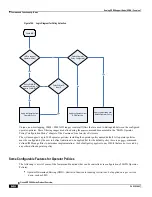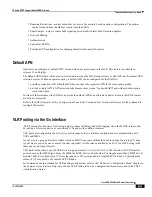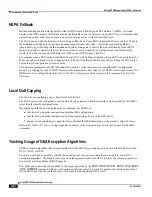
Serving GPRS Support Node (SGSN) Overview
▀ Features and Functionality - Basic
▄ Cisco ASR 5000 Series Product Overview
OL-22938-02
Mobility Management
The SGSN supports mobility management (MM) in compliance with applicable 3GPP standards and procedures to
deliver the full range of services to the mobile device. Some of the procedures are highlighted below:
GPRS Attach
The SGSN is designed to accommodate a very high rate of simultaneous attaches. The actual attach rate depends on the
latencies introduced by the network and scaling of peers. In order to optimize the entire signaling chain, the SGSN
eliminates or minimizes bottlenecks caused by large scale control signaling. For this purpose, the SGSN implements
features such as an in-memory data-VLR and SuperCharger. Both IMSI and P-TMSI based attaches are supported.
The SGSN provides the following mechanisms to control MN attaches:
Attached Idle Timeout
- When enabled, if an MN has not attempted to setup a PDP context since attaching, this
timer forces the MN to detach with a cause indicating that the MN need not re-attach. This timer is particularly
useful for reducing the number of attached subscribers, especially those that automatically attach at power-on.
Detach Prohibit
- When enabled, this mechanism disables the Attached Idle Timeout functionality for selected
MNs which aggressively re-attach when detached by the network.
Prohibit Reattach Timer
- When enabled, this timer mechanism prevents MNs, that were detached due to
inactivity, from re-attaching for a configured period of time. Such MNs are remembered by the in-memory
data-VLR until the record needs to be purged.
Attach Rate Throttle
- It is unlikely that the SGSN would become a bottleneck because of the SGSN‘s high
signaling rates. However, other nodes in the network may not scale commensurately. To provide network
overload protection, the SGSN provides a mechanism to control the number of attaches occurring through it on
a per second basis.
Beside configuring the rate, it is possible to configure the action to be taken when the overload limit is reached. See the
command in the ―Global Configuration Mode‖ chapter in the
Command Line
Interface Reference
. Note, this is a soft control and the actual attach rate may not match exactly the configured value
depending on the load conditions.
GPRS Detach
The SGSN is designed to accommodate a very high rate of simultaneous detaches. However, the actual detach rate is
dependent on the latencies introduced by the network and scaling of peers. A GPRS detach results in the deactivation of
all established PDP contexts.
There are a variety of detaches defined in the standards and the SGSN supports the following detaches:
MN Initiated Detach
- The MN requests to be detached.
SGSN Initiated Detach
- The SGSN requests the MN to detach due to expiry of a timer or due to administrative
action.
HLR Initiated Detach
- The detach initiated by the receipt of a cancel location from the HLR.
Mass detaches triggered by administrative commands are paced in order to avoid flooding the network and peer nodes
with control traffic.
Summary of Contents for ASR 5000 Series
Page 1: ......
Page 26: ......
Page 48: ...New In Release 10 0 SCM Features Cisco ASR 5000 Series Product Overview OL 22938 02 ...
Page 50: ......
Page 58: ......
Page 68: ......
Page 126: ......
Page 138: ......
Page 146: ......
Page 218: ......
Page 236: ......
Page 356: ......
Page 374: ......
Page 422: ......
Page 496: ......
Page 572: ......
Page 654: ......
Page 700: ......
Page 726: ......
Page 784: ......
Page 816: ......
Page 844: ......
Page 906: ......
Page 926: ......
Page 942: ......
Page 943: ...Cisco ASR 5000 Series Product Overview OL 22938 02 Chapter 30 Technical Specifications ...
Page 966: ......
Page 972: ......


